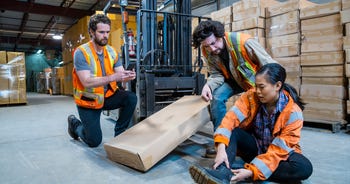Compare property maintenance insurance for business
Why do you need property maintenance insurance?
As a property maintenance worker or contractor, you could find yourself exposed to more risks than most other professions - one day you could be working at heights repairing roof tiles, the next day digging in gardens near fibre-optic cables or drilling in the basement near water pipes. It could even be necessary for something as simple, but costly, as spilling a can of paint over your client's expensive sofa during a refurbishment.
So it’s important to make sure you have adequate business insurance in place to make sure you're properly covered against these risks. A comprehensive property maintenance insurance package is the only way to prepare for the worst and potentially keep your business going and balance the books if you find yourself on the wrong end of a claim, unfortunate accident, theft or vandalism.
What cover should be included with property maintenance insurance?
Some of the key policies you may be offered as part of a property maintenance insurance policy include:
Public liability insurance
Public liability cover is essential if you work with members of the public, this covers against claims made against you for damage illness or injury made by anyone who’s not an employee of yours.
Employers’ liability insurance
Although there are exceptions, as outlined in our guide to employers’ liability insurance, most businesses that employ staff are legally obliged to have employers’ liability insurance in place to cover against any illness, injury or damage claims made by any of your employees.
Even if you employ labour-only subcontractors, you’ll still need to take out employers’ liability insurance if you employ, but you won’t need it if you only use self-employed subcontractors.
For more information on this critical cover, check our our employers’ liability insurance page.
Buildings and contents insurance
This cover comes in two separate parts - buildings insurance and contents insurance.
If you own your own business premises, buildings insurance protects the main structure and its permanent fixtures and fittings against weather and malicious damage. If you rent your business premises, your landlord might have taken out buildings insurance, but you should check with them to make sure they have done so.
Contents insurance covers the costs if you need to repair or replace any he contents that are stored at your business premises and are used for your work.
It’s also worth considering taking out additional tools insurance to specifically cover the tools and equipment associated with your business. Tools insurance can provide financial help with the repair or replacement of your tools after damage, theft or accidental loss, and can often covers the items both on and off site – as well as while they’re in transit or storage.
If you regularly hire plant or machinery as part of your work, you may benefit from purchasing separate cover for owned and hired plant and machinery.
Cash on premises cover
Cash on premises cover can provide compensation if any of cash you keep on site is lost or stolen.This cover can be attractive if your business handles material amounts of cash. It is worth knowing that some policies will have conditions on how you store the cash to ensure cover is valid. Make sure you check your wording to be sure.
Business interruption insurance
Business interruption insurance provides financial assistance if your business has to stop trading for any of the reasons covered by your insurance policy. It can cover against any loss of income, replacement tools and equipment, or for relocation to a temporary business premises.
Vehicle and goods in transit insurance
Vehicle insurance should cover both your work’s vehicle and any items you carry in it. If you’re in an accident while travelling for business, it should cover any hospital fees and replacement vehicle costs. Goods in transit insurance can be added to your policy to provide cover if you need to repair or replace tools and equipment that have become damaged or lost during transit.
Contract works insurance
Also called Contractors’ All-Risks (CAR) insurance, contract works insurance covers against you accidentally damaging the property you are working on, or damage caused by strong weather conditions.
This can be useful if you find yourself having to do two jobs at the same site for a singular payment – the work you were contracted to do, and the subsequent repairs that follow. As the name suggests, an all-risks policy usually covers a wide range of eventualities, and can cover plant and machinery alongside tools and temporary buildings, although you can purchase separate covers instead.
Personal accident insurance
Personal accident insurance can be useful if you become seriously ill or injured and are unable to work as a result. This cover can provide financial assistance to cover the loss of income during the time it takes you to recover and may also help with hospital bills or making essential adaptations to your home.
How to compare property maintenance insurance
When taking out property maintenance insurance, some insurers will limit the number of employees or apprentices you can insure under one policy, while others may allow cover for secondary trades within your property maintenance insurance package.
That’s why, before agreeing to take out cover, you always need to read the policy wording carefully and pay attention to any exclusions that may apply.
The simplest way to make sure your business is covered against the unexpected is to speak to the team at Bionic - we talk your language and won't waste your time, working with you to just find the right policies you need, with no unnecessary extras.
Protect your business now - Call the Bionic business insurance team to compare quotes from the UK’s most trusted insurers and adapt your insurance to suit the needs of your business.








